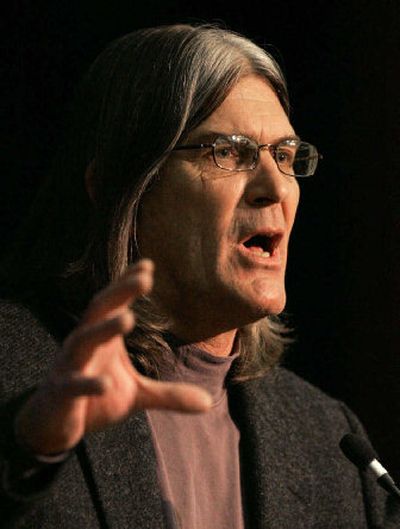Firing recommended for Churchill

BOULDER, Colo. – Nearly 18 months after an uproar erupted over a professor who likened some Sept. 11 victims to Nazis, the University of Colorado on Monday took its biggest step yet toward firing him.
The highest-ranking official at Colorado’s main campus called on the university to dismiss ethnic studies professor Ward Churchill for “a pattern of research misconduct committed over a period of time.”
Churchill did not immediately return telephone messages but has denied the allegations and dismissed the university’s investigation as a pretense to fire him. His attorney, David Lane, said Churchill will appeal and, if he loses, he will sue.
“I trust juries to make these decisions, not bureaucrats,” he said.
Churchill’s comparison of Sept. 11 victims to Nazis ultimately led to his speech being canceled at Eastern Washington University in April 2005. But he appeared on the Cheney campus anyway and drew 500 mostly enthusiastic spectators at an outdoor rally. He also addressed a class.
University of Colorado Interim Chancellor Philip DiStefano, who heads the university’s flagship Boulder campus, said he would recommend to the university system’s president and governing Board of Regents that Churchill be fired. His recommendation came after an investigation by a faculty committee concluded Churchill had committed plagiarism and other breaches in his academic research.
The investigation into Churchill’s research did not include his comments about the victims in the World Trade Center.
In an essay written shortly after the 2001 attacks, Churchill had described some of the victims as “little Eichmanns,” a reference to Holocaust architect Adolf Eichmann. He said later he was trying to make the point that some people in the buildings were participating in what he called an oppressive global economic system.
The essay was largely ignored until January 2005, when it came to light before Churchill was to speak at Hamilton College in upstate New York.
The essay caused an outcry and launched a national debate, with Churchill held up alternatively as a pillar of free speech rights or a symptom of liberal academia run amok.
University officials concluded he could not be dismissed because of First Amendment protections, but they did order the investigation into allegations of academic misconduct that came to light amid the controversy.
“As chief academic officer of the campus, I felt it was necessary to refer those allegations to the Standing Committee on Research Misconduct,” DiStefano said.
Asked if the allegations would have come to light if Churchill had not written the essay, DiStefano said, “That’s hard to tell.”
The committee last month concluded Churchill “has committed serious, repeated, and deliberate research misconduct,” findings DiStefano agreed with.
University officials said Churchill has been relieved of all academic work including teaching and work on committees but will remain a paid faculty member as long as the firing is in the appeals process. Kate Holt, a junior at the university, said the uproar over Churchill’s Sept. 11 remarks was “stupid” but said the research allegations raise concerns.
“As far as firing him, it seems more just a way for CU to look like it’s in control” after a series of scandals involving excessive drinking by students and alleged sexual misconduct by football players, she said.